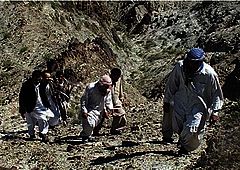Insurgent Group Jeish al-Adel Changing tactics?
» Revolutionary Guards Report Death in Latest Clash
The head of the public relations office of Iran’s Revolutionary Guards Corp (IRGC) general Ramezan Sharif announced that in the latest armed clashes between the Guards and members of the armed Jeish al-Adel insurgents around the town of Saravan in the south-eastern province of Sistan and Baluchistan, one guard was killed two Basiji militiamen were injured.
The return of armed clashes after a six-month lull has once again refocused the attention of observers and security officials on the armed group. Baluchi activists told Rooz that the mere name of the latest operation by Jeish al-Adel indicates that contrary to the claims of government officials, Jeish al-Nasr and Jeish al-Adel are not at war with each other and that the groups may have in fact changed their earlier tactics and have united. The latest operation carried out by al-Adel was called Abdol Raoof Rigi, the killed leader of the al-Nasr group.
The public relations office of the IRGC initially reported on Tuesday that it had neutralized an attack by “terrorists and rogues” in Saravan. Jeish al-Adel group issued its own statements confirming its attack on the IRGC post but claimed that it destroyed two government tanks and killed over 10 guards, contradicting the official statement of the Guards.
Al-Adel is an armed Sunni group that proclaims to be fighting for Iranian Baluchi rights. In its latest statement, the group also said that this week’s attack on the government post was in retaliation for the blood of Abdol Raoof Rigi who was the leader of al-Naser and who had broken away from the al-Adel group over the kidnapping of Iranian border guards earlier this year. Rigi was later reported to have been killed in Pakistan.
Sharif said that the reason for the recent attack by the al-Adel group was because of the internal differences within their camp, adding, “They wanted to get back in the limelight after the killing of one of their leaders which had taken place because of their own internal differences.”
But Abdol-Sattar Doshoki, an analyst who studies Baluchi and Sunni groups in Iran told Rooz that while the recent attack by al-Adel was a revenge operation it was not caused by a rivalry within their ranks or groups.
According to the Baluchistan research institute in London, by attacking the border post, al-Adel wanted to demonstrate that it in fact enjoyed relations with al-Naser, contrary to what the IRGC claims and they may be moving towards some sort of unity.
Rigi broke away from the al-Adel group following the group’s kidnapping of a number of Iranian border guards three months ago and killing one, and then formed his own group called al-Naser to fight the Islamic republic of Iran. In an interview with Rooz after he split from his group, Rigi said that he wanted to distance himself from al-Adel and described some of the differences he had with the group, essentially presenting a less confrontational tone than the other armed Baluchi groups.
According to Doshoki, Rigi had made it clear that he was going to change the group’s tactics vis-à-vis the Islamic republic, and avoid civilians and end suicide attacks, which are condemned by Baluchis.
In past years, groups such as al-Adel and Jondollah had on a number of occasions performed suicide attacks on civilians, mostly Shiites, in the province of Sistan and Baluchistan. According to Doshoki, the recent al-Adel attack on the border post which was carried out from a distance indicates that the group has decided to change its tactics and not attack civilians or engage in suicide attacks on public buildings.



